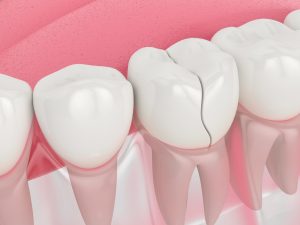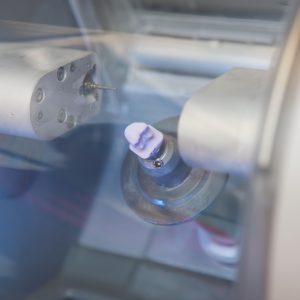Dental Crowns: Your Path to a Radiant Smile in West Sayville
At our Long Island dental practice, Dr. Richard Sigismondi is skilled in creating beautiful, healthy smiles through the artful application of dental crowns. Dental crowns are needed when there is significant damage or weak tooth structure, as they restore the strength and functionality of damaged teeth. These custom-made restorations not only repair damaged or decayed teeth but also breathe new life into your overall appearance. Discover how dental crowns can transform your smile by calling our West Sayville dental implant provider at 631-563-1583!
Understanding Dental Crowns
Dental crowns, often referred to as tooth caps, are prosthetic devices meticulously crafted to encase a compromised tooth. These restorations extend from the gum line to the chewing surface, effectively restoring the tooth’s function, shape, and aesthetic appeal. Dr. Sigismondi utilizes a variety of materials, including porcelain, ceramic, and metal alloys, to create crowns that seamlessly blend with your natural teeth.
Beyond their restorative capabilities, dental crowns play a crucial role in supporting dental bridges, capping dental implants, and serving as a cosmetic solution for various dental imperfections.
When Might You Need a Dental Crown?
Dr. Sigismondi may recommend a dental crown for several reasons:
- Reinforcing Weakened Teeth: Crowns provide essential support for a weak tooth structure compromised by decay, large dental fillings, or root canal therapy.
- Restoring Damaged Teeth: Cracked, broken, or severely worn teeth can be effectively rehabilitated with custom crowns.
- Enhancing Implant Restorations: Crowns serve as the visible, functional portion of dental implants, completing your smile restoration.
- Anchoring Dental Bridges: Crowns act as sturdy anchors for dental bridges, filling gaps left by missing teeth.
- Cosmetic Improvements: Misshapen, discolored, or poorly spaced teeth can be transformed with the application of dental crowns.
Telltale Signs You May Need a Crown
Be aware of these indicators that might suggest the need for getting a dental crown done:
- Persistent tooth pain or sensitivity
- Visible cracks or chips in your tooth
- A large, failing filling
- A tooth that’s undergone root canal treatment
- Noticeable tooth discoloration or an irregular shape
- A temporary dental crown may be needed while waiting for a permanent crown
The Benefits of Dental Crowns
Choosing dental crowns offers a wide range of advantages that go beyond simple tooth restoration. Here’s a more detailed look at the benefits of dental crowns:
- Enhanced Structural Integrity: Dental crowns provide full coverage protection for weakened or damaged teeth, preventing further deterioration and potential tooth loss.
- Functional Restoration: Crowns restore the ability to bite, chew, and speak with confidence, allowing you to enjoy a wider variety of foods and improving overall quality of life.
- Versatile Solutions: From cosmetic enhancements to major restorations, crowns address a wide range of dental issues, including severe decay, fractures, and teeth weakened by root canal treatment.
- Natural Aesthetics: Modern dental crowns are custom-made to match the color, shape, and size of your natural teeth, creating a seamless and beautiful smile.
- Improved Self-Confidence: By restoring the appearance of damaged or discolored teeth, dental crowns can significantly boost self-esteem and social confidence.
- Durability: With proper care and maintenance, dental crowns can last for many years, often five to 15 years or more.
- Cost-Effective: While the initial cost may be higher than some alternatives, the longevity and durability of crowns often make them a cost-effective solution in the long run.
- Preservation of Natural Tooth Structure: Crowns can often save severely damaged teeth that might otherwise require extraction, helping to maintain overall oral health and prevent further dental issues.
- Customized Treatment: Each crown is tailored to the individual patient’s needs, ensuring optimal fit, function, and aesthetics.
- Minimal Maintenance: Caring for dental crowns is similar to maintaining natural teeth, requiring no special cleaning routines beyond regular oral hygiene practices.
- Versatility in Material Options: Crowns can be made from various materials, including porcelain, ceramic, and metal alloys, allowing for customization based on the specific needs and preferences of each patient.
Diverse Dental Crown Options for Your Unique Needs
Dr. Sigismondi offers a variety of crown types to suit your specific requirements.
Porcelain Crowns
Porcelain crowns are ideal for front teeth, offering unparalleled aesthetic appeal with their ability to mimic natural tooth color and translucency. These crowns are highly customizable to match surrounding teeth, biocompatible and gentle on gum tissue, stain-resistant for long-lasting beauty, and capable of reflecting light similarly to natural enamel.
Metal Crowns
Metal crowns, composed of gold, nickel, stainless steel, or other alloys, boast exceptional durability, making them perfect for back teeth that endure intense chewing forces. They provide superior strength and longevity while requiring minimal tooth reduction during preparation. Additionally, they resist wear and fracture, making them an excellent option for patients with bruxism (teeth grinding). Metal crowns rarely chip or break, further enhancing their reliability for less visible molars.
Porcelain-fused-to-Metal (PFM) Crowns
Porcelain-fused-to-metal (PFM) crowns combine the strength of metal with the beauty of porcelain, offering a balance of durability and aesthetics suitable for any position in the mouth. These crowns feature a strong metal core for durability along with a porcelain overlay for a natural appearance. Their versatility allows them to be used on both front and back teeth, providing good longevity with proper care.
Zirconia Crowns
Zirconia crowns are cutting-edge options that offer superior strength and a natural appearance while being resistant to chipping. They are ideal for both front and back teeth due to their exceptional durability and chip resistance. Additionally, zirconia crowns are biocompatible and hypoallergenic, require minimal tooth reduction, and provide natural light transmission for a lifelike appearance.
Same-Day CEREC Crowns
Using advanced CAD/CAM technology, Dr. Sigismondi can design, fabricate, and place your crown in a single visit with same-day CEREC crowns. This innovative approach saves you time without compromising quality. The process involves high-quality digital impressions that lead to a precise fit, eliminating the need for temporary crowns.
Each type of crown has its unique advantages, and Dr. Sigismondi will work with you to determine the best option based on your specific dental needs, aesthetic preferences, and lifestyle factors.
The Dental Crown Procedure
The dental crown placement process typically involves three main stages:
Initial Consultation
During this first visit, Dr. Sigismondi conducts a comprehensive examination of your tooth. This includes taking detailed X-rays to assess the extent of damage or decay. The dentist will discuss your treatment options, explaining why a crown might be necessary and what alternatives, if any, are available. This consultation also provides an opportunity to address any questions or concerns you may have about the procedure.
Preparation Visit
In this crucial stage, Dr. Sigismondi prepares your tooth to receive the crown. The affected tooth is carefully reshaped, removing a small amount of enamel to make room for the crown. This reshaping ensures that the crown will fit snugly and align properly with your bite.
After reshaping, our dentist takes precise impressions of your tooth. These impressions serve as a blueprint for crafting your custom crown, ensuring an exact fit. To protect your prepared tooth while the permanent crown is being made, a temporary dental crown is placed.
Temporary Crowns
Temporary crowns play a crucial role in the dental crown procedure, acting as a protective barrier for your tooth while the permanent crown is being crafted. Typically made from stainless steel or acrylic resin, these crowns are attached to the prepared tooth with temporary cement. They are essential for certain types of permanent crowns, especially those fabricated in a dental lab, though they are not needed for monolithic ceramic crowns, which can be made in a single dental appointment.
Temporary crowns serve several important purposes:
- Protection: They shield the tooth from further decay or damage during the interim period.
- Maintenance: They help maintain the tooth’s shape and appearance, ensuring that the final crown will fit perfectly.
- Functionality: They allow you to chew and speak normally while waiting for the permanent crown.
These temporary solutions are usually crafted either at the dental surgery or in a dental laboratory and are designed to be worn for a short period, typically a few weeks, until your permanent crown is ready.
Permanent Crowns
Permanent crowns are custom-made restorations designed to fit your individual tooth perfectly and last for many years. These crowns can be made from a variety of materials, including metal, ceramic, and resin, each offering unique benefits. Once crafted, permanent crowns are cemented in place using a special adhesive, ensuring they can withstand the forces of biting and chewing.
Permanent crowns are used to:
- Restore: They effectively restore teeth that have been damaged or decayed.
- Enhance Appearance: They improve the aesthetic appeal of a tooth, contributing to a more attractive smile.
- Support: They provide essential support for teeth with large fillings.
- Protect: They safeguard teeth that have been weakened by root canal treatments.
Whether made in a dental laboratory or using advanced CAD/CAM technology for same-day placement, permanent crowns offer a durable and aesthetically pleasing solution for a variety of dental issues.
Dental Crown Placement
Once your custom dental crown is ready, you’ll return for the final placement. Dr. Sigismondi first removes the temporary crown and thoroughly cleans the tooth. The permanent crown is then carefully checked for fit, color match, and bite alignment. The dentist will also check how the crown interacts with opposing teeth to ensure proper fit and alignment. Minor adjustments may be made to ensure perfect fit and comfort.
When both you and the dentist are satisfied with the fit and appearance, the dental crown is permanently cemented in place. After cementing, Dr. Sigismondi provides detailed care instructions to help maintain your new dental crown and ensure its longevity. This includes guidance on proper brushing and flossing techniques, as well as any dietary considerations.
Dental Crown Costs
The cost of a dental crown can vary widely, typically ranging from $800 to $1700 or more per crown. Factors influencing the cost include the type of material used and the location of the dental practice. Fortunately, a portion of the cost is generally covered by dental insurance.
Frequently Asked Questions
With proper care, dental crowns can last 10 to 15 years or even longer. Regular check-ups and dental visits with your dentist will help maintain the longevity of your dental crown.
Your dentist ensures your comfort throughout the dental crown process using local anesthesia. Most patients report minimal discomfort during and after the dental crown procedure.
While traditional crowns usually require two visits, our practice offers same-day CEREC crowns for qualifying patients, allowing for completion in a single appointment.





